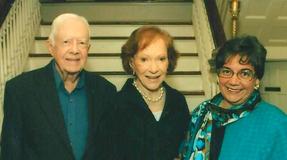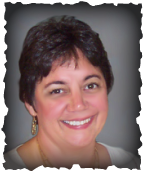|
12/11/2013 Hope and Help for Caregivers
The RCI is a service unit of Georgia Southwestern State University in Americus, Georgia, and combines advocacy, education, research and service in supporting caregivers by promoting caregiver health, skills, and resilience. The focus is on helping caregivers cope with chronic illnesses and disability across the lifespan. This includes such a wide range (everything from autism to cancer, Alzheimer's to traumatic brain injury) that to get a full representation, I suggest you take a look at their caregiver resources page: www.rosalynncarter.org/ which features over 100 links to information and assistance sites. The programs of outreach include the Georgia Care-Net Coalition, which represents 12 regions around the state and serves as a voice for caregivers, the REACH program for Alzheimer's caregivers providing training and support in partnership with other organizations in 17 states, and Operation Family Caregiver, which provides free, confidential support, counseling and training for military family caregivers in-home, or via telephone or Skype. If you or someone you know could benefit from this program, call for information at (229) 931-2034.
The Summit featured keynote speaker Elizabeth Dole, who spoke eloquently on behalf of the million (yes, million!) military caregivers who are valiantly trying to cope with the approximately 725,000 veterans who are returning from the battlefield with both visible and invisible injuries and disabilities, including post-traumatic stress disorder (PTSD) and traumatic brain injury (TBI). The urgent need is overwhelming the services the Veteran's Administration is able to provide, leaving so many families in dire straights. Elizabeth Dole has created a foundation to assist these many military family caregivers in coping with the crisis: Elizabeth Dole Foundation website With Elizabeth Dole's inspiring and passionate words still reverberating in our hearts, there was a brilliant presentation by Gregory Fricchione, MD, Associate Chief of Psychiatry and Director Benson Henry Institute for Mind Body Medicine at Massachusetts General Hospital and Professor of Psychiatry at Harvard Medical School. Dr. Fricchione's presentation was simply amazing in its depth, scope and brilliance as he related very technical evidence of how the very evolution of the human brain over 120 million years influences those suffering PTSD and TBI. He communicated this complex information in such an accessible way and with humor and compassion that I found it truly engaging. I couldn't miss the comparisons of battlefield stress disorders with some of the same symptoms exhibited in the chronically stressed caregiver. Dr. Fricchione put it in context that was understandable and also hopeful. His funniest points were about the greater adaptability of slime mold (as compared to the human brain) and also, his opinion that the canine species was infinitely superior in unconditional love. (I think I agree with him about dogs! He even showed a video clip of his dog meditating - definitely a higher species!) I was vastly reassured that such brilliant researchers are bringing light to the issues we are facing. If you'd like more about this, his slide show may be found through a link on RCI's homepage for more Summit info. Without his charming quick wit and personality, it just isn't the same! I was so impressed with the excellence of the programs and the caring compassionate hearts of the people involved. I met people from all over the world who are each working in their own way to support caregivers. There was such an atmosphere of hope, collaboration and cooperation and the convergence of politics, education, public support, private corporate sponsorship, recognition of excellence, community outreach and caring hearts -- I have never seen the like before. How could one not be inspired and uplifted? 5/27/2013 A Lesson on Stress A young lady confidently walked around the room while leading and explaining stress management to an audience with a raised glass of water. Everyone knew she was going to ask the ultimate question, 'half empty or half full?'... She fooled them all .... "How heavy is this glass of water?" she inquired with a smile. Answers called out ranged from 8 oz. To 20 oz. She replied , "The absolute weight doesn't matter. It depends on how long I hold it. If I hold it for a minute, that's not a problem. If I hold it for an hour, I'll have an ache in my right arm. If I hold it for a day, you'll have to call an ambulance. In each case it's the same weight, but the longer I hold it, the heavier it becomes." She continued, "and that's the way it is with stress. If we carry our burdens all the time, sooner or later, as the burden becomes increasingly heavy, we won't be able to carry on." "As with the glass of water, you have to put it down for a while and rest before holding it again. When we're refreshed, we can carry on with the burden - holding stress longer and better each time practiced. So, as early in the evening as you can, put all your burdens down. Don't carry them through the evening and into the night... Pick them up tomorrow. For caregivers, this lesson is especially important. You need to put down the "glass of water" and rest. 1 * Accept the fact that some days you're the pigeon, and some days you're the statue! 2 * Always keep your words soft and sweet, just in case you have to eat them. 3 * Always read stuff that will make you look good if you die in the middle of it. 4 * Drive carefully... It's not only cars that can be recalled by their Maker. 5 * If you can't be kind, at least have the decency to be vague. 6 * If you lend someone $20 and never see that person again, it was probably worth it. 7 * It may be that your sole purpose in life is simply to serve as a warning to others. 8 * Never buy a car you can't push. 9 * Never put both feet in your mouth at the same time, because then you won't have a leg to stand on. 10 * Nobody cares if you can't dance well. Just get up and dance. 11 * Since it's the early worm that gets eaten by the bird, sleep late. 12 * The second mouse gets the cheese. 13 * When everything's coming your way, you're in the wrong lane. 14 * Birthdays are good for you. The more you have, the longer you live. 16 * Some mistakes are too much fun to make only once. 17 * We could learn a lot from crayons. Some are sharp, some are pretty and some are dull. Some have weird names and all are different colors, but they all have to live in the same box. 18 * A truly happy person is one who can enjoy the scenery on a detour. 19 * Have an awesome day and know that someone has thought about you today. AND MOST IMPORTANTLY 20 *Save the earth..... It's the only planet with chocolate!* I THINK !!!! 9/9/2012 Lessons from Alzheimer's, Part 1I found Alzheimer’s Disease to be a very powerful teacher over the course of my Mom’s 17-year journey through it. I want to share with you a couple of the most enlightening, soul-changing lessons it taught me:
1.) Acceptance -- Alzheimer’s is a “kick in the gut” kind of disease. The diagnosis knocks the wind out of you like falling off a galloping horse and hitting the ground at great speed. It hurts like hell and leaves you bruised and aching. You have a visceral, deep, grief reaction, as if you’d been told someone you love died. And, in a sense, Alzheimer’s can be thought of as a very slow, mind-stealing, personality-altering thief of life. But it doesn’t have to be! When my mother was diagnosed, first I got very angry and railed at the Universe that such a sweet, wonderful person, who gave selflessly to others all her life, could possibly be punished with this affliction. Once I moved beyond that, I wanted to stick my head firmly in the sands of denial and keep it there for a decade or two. But I couldn’t. I had to help her through it. I had to accept what was -- reality. But I’m not talking about curling-up-in-a-small-ball-of misery-and-waving-the-white-flag-of-surrender kind of acceptance. No, indeed! What I’m advocating is a sort of life-affirming, defiant acceptance. The kind where you look fear (and Alzheimer’s) in the face and say, “I may not be able to stop you from taking precious pieces of my loved one, but you can’t take away our love, devotion, dignity and simple human pleasures of living. You can’t define who my mother is or who I am. You can’t take away the joy of being alive!” My defiant acceptance approach served us very well over the years. It gave me perspective on things and helped me navigate the very tough choices that had to be made on a day by day, sometimes moment by moment basis. Defiant acceptance allowed me to be not only the best advocate for my mother, but also the best daughter I could be. Both are vital. So, if you face a diagnosis of AD (I’m calling it AD from here on because it’s shorter to type), you can take the defiant acceptance approach, for yourself or your loved one. Cultivate the positive treasures of life, and wring every single drop of love and joy and satisfaction from each moment. It may not change the outcome, but it will make the journey rich, abundant, & beautiful beyond measure. Life worth living… 2.) Patience -- I don’t know about you, but for me Patience with a capital “P” has been a life-long lesson. Apparently, I’m a slow learner, so I’ve been given zillions of opportunities with this one! But Patience, like Acceptance, has many faces or facets. I found I was absolutely no good at sitting back in resigned silence, waiting for things to change or un-change back to what they were. I’m not that kind of person. I have way too much energy, passion and purpose for changing the world to be patient with injustice, with evil, with willful destruction of our planet, with man’s inhumanity to man, with greed, cruelty or unnecessary suffering -- all of which are crippling our world. So, in some circumstances at least, impatience is called for as a driving motivator for change, a call to action. Maybe I’m just trying to put my flaw in the best possible light :) But, be that as it may, I have lived my life learning patience over and over. Alzheimer’s Disease is a wonderful teacher of patience. Oh boy, is it ever! I had to learn to hear unlimited repetition -- of stories, of sayings, of poems, of songs, of questions, of observations -- I called this the endless-loop feature of AD. My Mom would just get “stuck” in an endless loop of repeating the same thing. For example, we were stranded in an airport after missing a connection (due to weather) and had a 5 hour wait for the flight home from a wedding. This was the last time I traveled with her alone by air. It had already been a very stressful trip. One in which my mother, as is common with AD, got very confused being in unfamiliar surroundings, out of her routine. I was sad that even while visiting the house where she was born and grew up, where her sister was still living, she remembered it not at all. So much for long term memory, I thought. So, as we were sitting in the airport (a place full of noise and commotion and distraction), I wasn’t able to leave her side, even for a minute--to get food, or tend to a call of nature. We were joined at the hip for five very long torturous hours. She must have asked the question, “Where are we going?” at least a thousand times. I’m not exaggerating. I started out telling her, in detail that we were going home from a wedding, I told her where we had been, whom we had seen, etc., but after the 248th repetition of this explanation, I got creative. Realizing that whatever I said wasn’t “sticking” in her brain, I just made up destinations -- like, Timbuktu, Crazy Wanna Come, Somewhere Over the Rainbow, and on like that. It became a kind of game, to distract her and keep me from going over the edge into insanity. It worked! It even entertained our seatmate on the plane, where Mom continued to ask the question and receive my very outlandish creative answers. It was harmless enough, and a rather good coping skill. But seriously, AD pushes anyone’s patience to the max. Even a saint might be sorely tried by the level of patience required 24/7/365. I’m not a saint (as those who know me will attest). But, I found the deep well of patience was there for me to draw upon in dealing with Mom’s condition, over and over, day after day, year after year. No, I wasn’t perfect, God no. I made mistakes. We all do. Here’s the big secret: as a caregiver, you don’t have to be perfect. You just have to be “there” and willing. That’s it! I just gave you perhaps the most valuable tool you’ll ever get -- you can forgive and be gentle with yourself. Your compassion for your loved one can spill over for yourself and that’s perfectly fine. So, try your hand at practicing Creative Patience, or Selective Patience, and see how it changes your inner self and eases the journey. I’ll continue these Lessons from AD in future blog posts. Stay tuned for more action and adventure on the journey of care giving! 5/4/2012 IsolationI just read a blog post by Gail Sheehy, author, speaker, caregiver advocate, and general mover & shaker. Her book, Passages in Caregiving: Turning Chaos into Confidence, is featured on the Books Page of this website. Her post is titled, "What can bring caregivers out of the house before they go nuts?" Yes, the title caught my eye. It's a wonderful post about a newly formed Caregiver Coalition in Jacksonville, Florida, which recently had a huge Expo for the estimated 150,000 family caregivers in the city. It was a phenomenal success and the various agencies which form the Coalition are seeing how underserved this segment of the population actually is, and how starved for information. Sheehy's blog is calling us to action to form similar coalitions all over the country to support the 65 million caregivers -- yes, that number is right! And, the real consequences to the health, mental, physical & emotional, for these unpaid family caregivers is astronomical. She cites stress, anxiety, depression, alcohol & substance abuse, high blood pressure, obesity, diabetes, and the list is endless, as major issues for the 45-55 age group that forms the Boomers caregivers brigade.
I absolutely and heartily agree! Having experienced some of these problems first hand, and realizing how deep this need goes, and how many millions of people are affected, if we don't act now, and really grab this tiger by the tail, finding real, practical and accessible solutions, we are going to have a bunch of nutty, stressed out isolated folks on our hands! Check out the blog at her website: www.gailsheehy.com/blog/592/what-can-bring-caregivers-out-of-the-house-before-they-go-nuts- |
About Karen
Karen is a compassionate, enthusiastic student of life, who cared for her mother for 17 years. She brings her insights, compassion, experience and desire to share knowledge and healing to this ongoing conversation with others on the caregiving path. If you are caring for a parent, spouse, friend or other loved one this site offers sanity-saving tips, open-hearted self-care ideas, and an open forum for discussion, connection and sharing resources for the journey. Archives
October 2021
CategoriesAll Acceptance Aging Together Alan Cohen Alive Inside Movie Alzheimer's Alzheimer's Prevention A Mind Of Your Own Anxiety Aromatherapy Audio Therapy For PTSD Austin Air Hepa Filter Autism Back Care Video Beginner's Mind Being Present Blessing For Caregivers Books Brain Insulin Butterfly Story Calm Calm.com App Care For Veterans Caregiver Advocate Caregiver Coalition Caregiver Comfort Kit Caregiver Guilt Caregiver Retreat Caregiver's Serenity Prayer Caregiver Stress Caregiver Support Care Giving Caregiving Vulnerability Care In Hospital Caterpillar Into Butterflies Chamomile Tea Cindy Laverty Comedian Computers & Exercise Crisis Dan Cohen Deepak Chopra Delirium Depression Diabetes Disaster Preparedness Distractions Dr. Dharma Singh Khalsa Dr. Oliver Sacks Eden Alternative Eldershire Elizabeth Dole Foundation Emergency Planning Emergency Preparation Emerson End Of Caregiving Enough Already Escapism Essential Oils Food Safety Forgiveness Funny Stories Gaiam.com Gail Sheehy Gift Of Alzheimer Gift Of Healing Presence GMO Food Green House Project Gregory Fricchione Md Grief Guilt Happy Light Healing Holding Hands Home As Sanctuary Hope Hospital Caregiving Hospital Stay Humor Inspirational Reading Ipods For Nursing Homes Isolation Jacksonville James E. Miller John Denver Johns Hopkins Study John T. McFadden Jon Kabat-Zinn Kelly Brogan Kirtan Kriya Meditation Lao Tzu Laugh Laughter Lavender Loneliness Loss Of Purpose Love Love In The Nursing Home Maya Angelou Mayo Clinic Mayo Clinic Alzheimer's Blog MD Meditation Meditation Garden Melatonin Memory Memory Cafe Military Caregiver Mindfulness Meditation Mr. Bean Music Music & Alzheimer Music And Memory Neurological Research Noise Pollution Operation Family Caregiver Opportunity Overnight Respite Care Pandemic Passages In Caregiving Patience Paul Coelho Peace Post-traumatic Stress Disorder Power Of Love Prayer PTSD Quality Of Sleep Radical Contentment Relaxation Releasing Problems Renewal Research Respite Rewind Rodney Yee Rosalynn Carter Rosalynn Carter Institute For Caregiving Rowan Atkinson Sanctuary Sanity Self Care Serenity Silence Sleep Slowing Time Solutions Soothing Music Stress Stress Relief Sun Sunshine Support For Caregivers Tai Chi Thanksgiving The Care Company The Kiss Time Traumatic Brain Injury Travel With Alzheimer's Person Treat VA Caregivers Valentine's Day Verilux Veteran Farms Veterans Veteran Suicide Vitamin D Wayne W. Dyer Wellness Wendell Berry White Noise William H. Thomas Worry Yoga Yoga Video |



